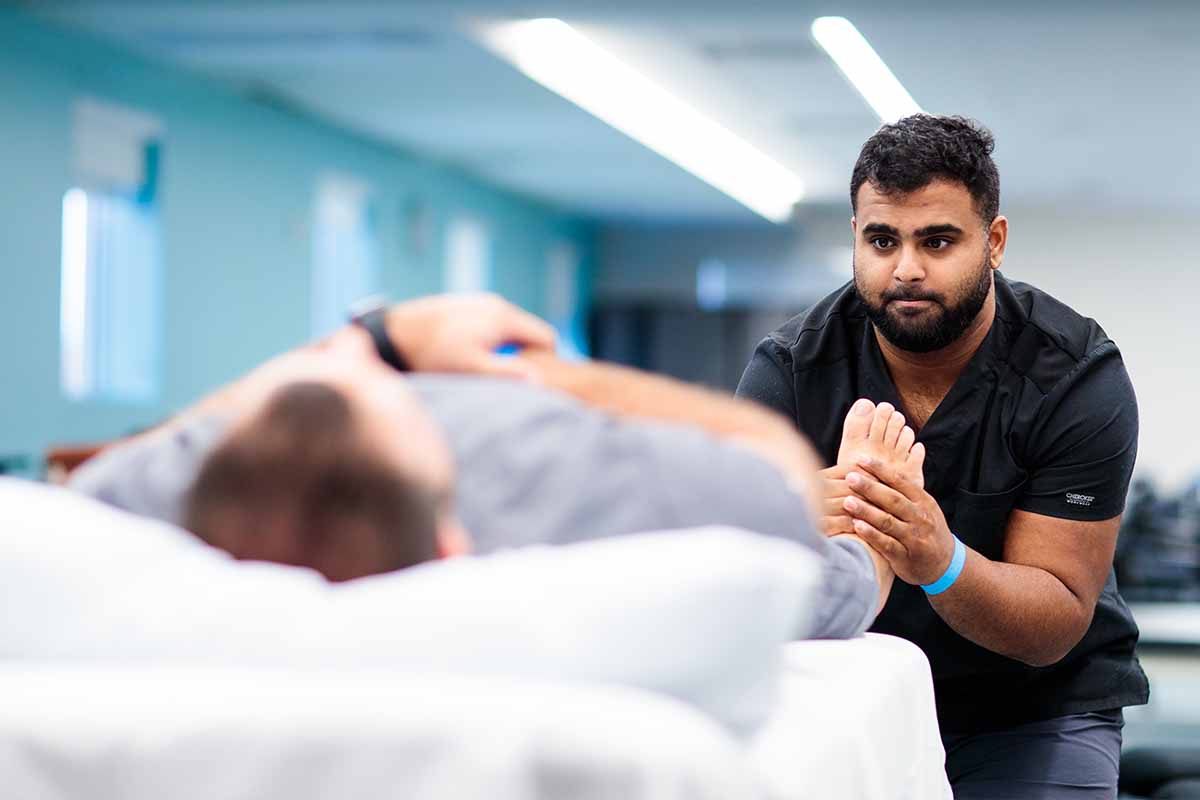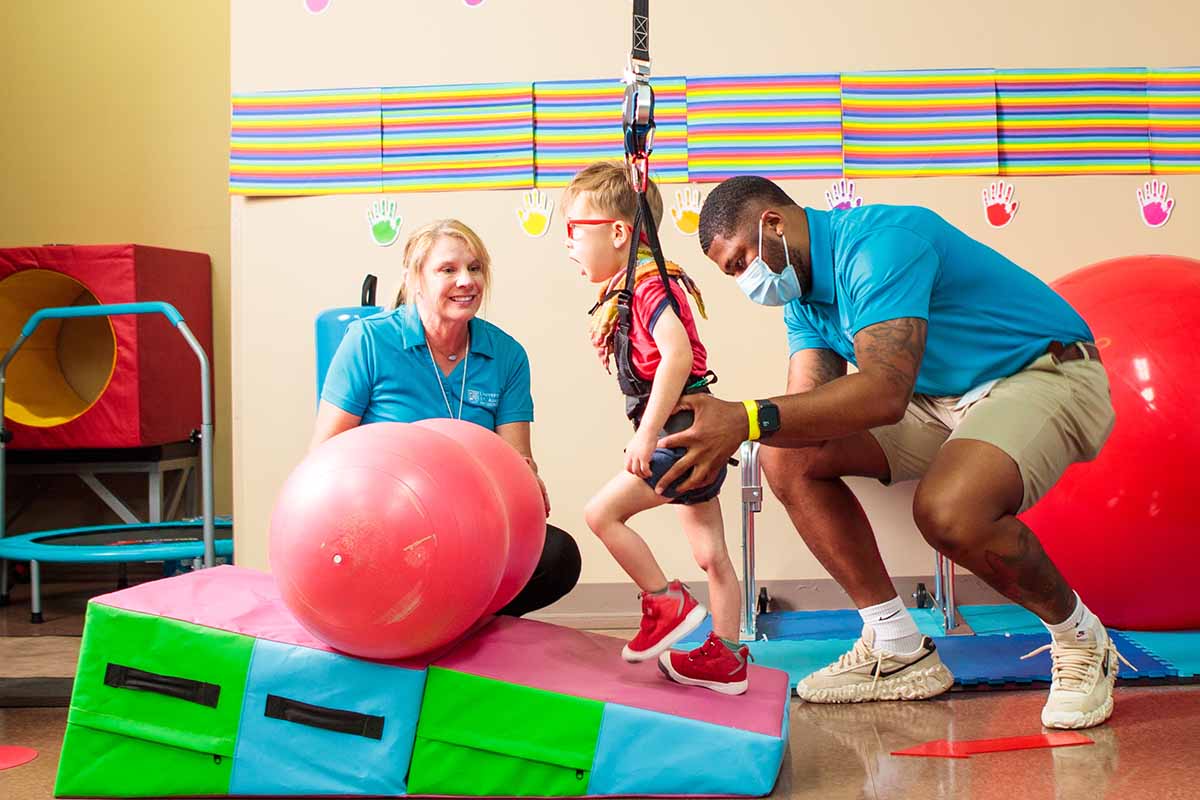
As a physical therapist (PT), choose one or more physical therapy specialties throughout your professional career. Adding a specialty certification demonstrates your expertise in your area of passion, enhances your credentials and opens doors to new job possibilities, some of which may even be virtual.
To specialize in different types of physical therapy, first become a physical therapist and practice direct patient care for at least 2,000 hours in your area of specialization.1 After that, you can apply for specialty certification from the American Physical Therapy Association (APTA) in one of ten physical therapy specialties.2 In some cases, you must take classes or an exam; in others, proving your prior experience is all that is needed.
What Is a Physical Therapy Specialization?
According to the American Board of Physical Therapy Specialties (ABPTS), choosing to pursue a specialization in physical therapy helps PTs raise their competency level, advance their career, earn professional recognition and be at the forefront of developments in research and practice.3
More than 37,000 physical therapists in the United States have certified specializations in physical therapy as of June 2023.4 Those who choose to specialize in physical therapy hone their skills in one area of expertise and work toward becoming a mentor and leader.
Board-Certification Eligibility Requirements
Different types of physical therapy specialties have criteria for obtaining physical therapist certifications. However, the following requirements must be met by all candidates:1
- Obtain licensure to practice physical therapy in the United States.
- Pay the application review fee of $535 for APTA members or $880 for non-APTA members prior to July 1 (or the rate increases).5
- Submit a separate application for each specialist certification you wish to obtain.
- Pass the clinical specialty exam. Exam fees are $810 for APTA members and $1,535 for non-members.5
Physical Therapy Specialties


The American Board of Physical Therapy Specialties recognizes ten areas of physical therapy specializations.2 Read on for a description of the different physical therapy specialties you can embark on in your career.
Learn More About the University of St. Augustine for Health Sciences’ (USAHS) PT Programs
1. Cardiovascular & Pulmonary Clinical Specialist (CCS)
Established by APTA in 1981, the cardiovascular and pulmonary specialization was the first of the different types of physical therapy specialties to be board-certified.6 Cardiovascular and pulmonary specialists are equipped to help patients manage heart and lung conditions. For example, they help patients recover from heart attacks or open-heart surgery, and they can help patients manage respiratory diseases such as chronic obstructive pulmonary disease (COPD).7
To become a cardiovascular and pulmonary specialist, applicants must meet the following requirements:1
- Hold current Advanced Cardiac Life Support (ACLS) certification by the American Heart Association
- Submit evidence of participation within the past 10 years in a clinical data analysis project directly related to the cardiovascular and pulmonary specialty area
- Complete a prerequisite amount of direct patient care practice in this specialty through either 2,000 working hours (25% of which must have occurred within the last three years) or an APTA-accredited post-professional clinical residency
2. Geriatric Clinical Specialist (GCS)
Due to an increasingly aging U.S. population, this is one of many PT specialties that is becoming more relevant. Physical therapists who specialize in geriatrics are experts in helping patients with musculoskeletal conditions like arthritis and osteoporosis, as well as progressive neurological diseases like Alzheimer’s and Parkinson’s.8
To earn their specialization in geriatrics, applicants must meet the following minimum APTA requirements:1
- 2,000 hours of direct patient care in geriatrics within the past 10 years (25% of which must have occurred within the last three years) or
- Successful completion of an APTA-accredited geriatrics residency within the past 10 years
3. Orthopaedic Clinical Specialist (OCS)
Orthopaedics has historically been considered the most popular of the different types of physical therapy, with 21,401 certified specialists in the United States as of June 2023.9 Orthopaedic specialists treat injuries and adverse conditions of the bone, muscle, tendons, ligaments and joints.10 They also see patients with musculoskeletal disorders such as arthritis or those recovering from surgery.10
The requirements to become an orthopaedic specialist include:1
- 2,000 hours of direct patient care in orthopaedics, or evidence of observational or mentored patient care hours, subdivided into body region groupings, or
- Successful completion of an APTA-accredited orthopaedic residency
Please note the new requirements for Initial Orthopaedic Specialty Certification as of 2026 Exam Administration.
4. Neurologic Clinical Specialist (NCS)
PTs who pursue the in-demand neurology specialty treat patients with developmental, systemic and traumatic disorders that affect the neuromuscular system.11 Relative to other different physical therapy specialties, as of June 2023 there are 4,557 PTs specialized in this category of practice.11
Physical therapists looking to obtain a specialization in neurology must complete these patient care prerequisites:1
- 2,000 hours of direct patient care in neurology within the past 10 years (25% of which must have occurred within the last three years) or
- Successful completion of an APTA-accredited neurology residency within the past 10 years
5. Pediatric Clinical Specialist (PCS)
Pediatric specialists treat physical conditions in young people, from infants to children.7 Compared to other types of physical therapy specialties, pediatric specialists commonly see young patients with conditions such as cerebral palsy, cystic fibrosis and other conditions.7
The requirements to become a pediatric specialist include:1
- 2,000 hours of direct patient care in pediatrics within the past 10 years (25% of which must have occurred within the last three years) or
- Successful completion of an APTA-accredited pediatrics residency within the past 10 years
6. Oncology Specialist
Oncology specialists study the treatment of various types of cancer and work with patients who are undergoing treatment or recovering from cancer and other chronic illnesses.12 Relative to other PT specialties, oncology specialists help patients manage and recover from musculoskeletal, neuromuscular, integumentary, cardiovascular and pulmonary rehab needs.12
Oncology specialists must complete these requirements to obtain certification for cancer care:1
- 2,000 hours of direct patient care in oncology within the past 10 years (25% of which must have occurred within the last three years) or
- Successful completion of an APTA-accredited oncology residency within the past 10 years
- One case report demonstrating specialty practice in oncologic physical therapy within the last three years
7. Women’s Health Specialist (WCS)
A newer specialization in physical therapy, women’s health spans advanced knowledge in foundational science, behavioral science, clinical science, client management and practice management in conditions affecting women of all ages.13 Compared to other types of physical therapy specialties, PTs in this area often help women experiencing pelvic region issues such as incontinence or sexual problems.7
To become a women’s health specialist, applicants must fulfill specific requirements, including:1
- 2,000 hours of direct patient care in women’s health within the past 10 years (25% of which must have occurred within the last three years) or
- Successful completion of an APTA-accredited women’s health residency within the past 10 years
- A case study demonstrating specialty practice in women’s health that occurred with a patient/client within the last three years
8. Electrophysiologic Clinical Specialist (ECS)
As one of the newest PT specialties, electrophysiologic clinical specialists treat human dysfunctions utilizing electricity to monitor, measure or produce physiologic responses in patients and clients.14
The requirements to become an electrophysiologic clinical specialist are as follows:1
- Submit a list of at least one (but no more than three) relevant individual learning experiences completed under the guidance of a physical therapist who is board-certified in clinical electrophysiology or a physician who is board-certified in electrodiagnostic testing within the past 10 years, along with a letter from the colleague providing oversight of that experience
- Submit patient reports completed and testing log documentation of 500 of the most recent electrodiagnostic examinations completed within the past 10 years
- 2,000 hours of direct patient care in electrophysiology within the past 10 years (25% of which must have occurred within the last three years) or
- Successful completion of an APTA-accredited clinical electrophysiology residency within the past 10 years
9. Sports Clinical Specialist (SCS)
This might be one of the most exciting physical therapist specialties to pursue. Sports clinical specialists treat amateur and professional athletes like Olympic athletes with the circular marks of cupping therapy in recent years. As experts in injury management and rehabilitation, sports medicine specialists have career options available, which makes it a great field among the different physical therapy specialties.
To become a sports clinical specialist, physical therapists must meet the minimum APTA requirements, which include:1
- CPR certification via the American Heart Association’s BLS Healthcare Provider Course or the American Red Cross CPR for the Professional Rescuer course
- Acute Management of Injury & Illness certification
- 2,000 hours of direct patient care in sports within the past 10 years (25% of which must have occurred within the last three years). Of those 2,000 hours,100 of them must be in an athletic venue (50% of which must be performed with a contact sport like basketball or football) or
- Successful completion of an APTA-accredited sports residency within the past 10 years
10. Wound Management Specialist
Of the different physical therapy specialties, wound management is the newest. The first certification examination in wound management was administered in 2022. As of June 2023, the ABPTS has certified 23 specialists in this field of physical therapy.15 A PT who specializes in this type of physical therapy ensure wounds heal (for example, after surgery) appropriately and assist in your recovery to normal movement.7
Compared to other physical therapist specialties, earning certification as a wound management PT requires the following:1
- 2,000 hours of direct patient care in sports within the past 10 years (25% of which must have occurred within the last three years) or
- Successful completion of an APTA-accredited wound management residency within the past 10 years
- A case report demonstrating specialty practice in this field that’s occurred within the last three years
- Possess certification in Cardiopulmonary Resuscitation (CPR), completed through the American Red Cross CPR for the Professional Rescuer course or the American Heart Association’s BLS Healthcare Provider course


The largest PT school in the United States,* the University of St. Augustine for Health Sciences (USAHS) offers a hands-on Doctor of Physical Therapy (DPT) degree. Join a collaborative cohort of peers who learn under the mentorship of expert faculty-practitioners. Practice with mock and real patients in our state-of-the-art simulation centers and learn anatomy with our high-tech tools. Prepare for clinical practice with a wide range of patients, as well as for advanced roles in research, practice leadership and policymaking. Residential (blended didactic courses + in-person labs on weekdays), Hybrid Immersion** (online coursework with on average two immersive on-campus labs per term) and Flex (online courses + in-person labs on select weekends) formats are available.
*Based on total DPT degrees conferred during 2020-2022, as reported by the Integrated Postsecondary Education Data System (IPEDS). Data is captured by IPEDS through interrelated surveys conducted annually by the Department of Education’s National Center for Educational Statistics (NCES).
**The University of St. Augustine for Health Sciences (USAHS) is seeking approval from the Commission on Accreditation in Physical Therapy Education (CAPTE) for an expansion of its Doctor of Physical Therapy (DPT) program at its San Marcos, CA, and Miami, FL, campuses with a Hybrid Immersion model. Approval of the expansion programs is required prior to implementation.
Applicants interested in the Hybrid Immersion DPT format should contact an enrollment advisor using the request for information form on our site.
Sources:
- APTA Specialist Certification, “Minimum Eligibility Requirements and General Information for All Physical Therapist Specialist Certification,” APTA, 2024, https://specialization.apta.org/become-a-specialist/minimum-requirements.
- American Physical Therapy Association, “Specialist Certification,” APTA, 2024, https://www.apta.org/your-career/career-advancement/specialist-certification.
- APTA Specialist Certification, “Become an ABPTS-Certified Specialist,” APTA, 2024, https://specialization.apta.org/become-a-specialist.
- APTA Specialist Certification, “ABPTS Certified-Specialists Statistics,” APTA, 2024, https://specialization.apta.org/about-abpts/abpts-certified-specialists-statistics.
- APTA Specialist Certification, “APTA Specialization Program Fee Schedule and Deadlines,” APTA, 2024, https://specialization.apta.org/become-a-specialist/fees-deadlines.
- APTA Specialist Certification, “Become a Board-Certified Cardiovascular and Pulmonary Clinical Specialist,” APTA, 2024, https://specialization.apta.org/become-a-specialist/cardiovascular-pulmonary.
- Timothy Gower, “What Is Physical Therapy?,” WebMD, May 28, 2024, https://www.webmd.com/pain-management/what-is-physical-therapy.
- Christine Yu, “The Benefits of Physical Therapy for Older Adults,” WebMD, April 2, 2024, https://www.webmd.com/healthy-aging/features/physical-therapy-benefits-for-seniors.
- APTA Specialist Certification, “Become a Board-Certified Orthopaedic Clinical Specialist,” APTA, 2024, https://specialization.apta.org/become-a-specialist/orthopaedics.
- WebMD Editorial Contributors, “What Is An Orthopedic Physical Therapist?,” WebMD, July 10, 2023, https://www.webmd.com/a-to-z-guides/what-is-an-orthopedic-physical-therapist.
- APTA Specialist Certification, “Become a Board-Certified Neurologic Clinical Specialist,” APTA, 2024, https://specialization.apta.org/become-a-specialist/neurology.
- APTA Specialist Certification, “Become a Board-Certified Oncologic Clinical Specialist,” APTA, 2024, https://specialization.apta.org/become-a-specialist/oncology.
- APTA Specialist Certification, “Become a Board-Certified Women’s Health Clinical Specialist,” APTA, 2024, https://specialization.apta.org/become-a-specialist/womens-health.
- APTA Specialist Certification, “Become a Board-Certified Clinical Electrophysiologic Clinical Specialist,” APTA, 2024, https://specialization.apta.org/become-a-specialist/clinical-electrophysiology.
- APTA Specialist Certification, “Become a Board-Certified Wound Management Clinical Specialist,” APTA, 2024, https://specialization.apta.org/become-a-specialist/wound-management.










